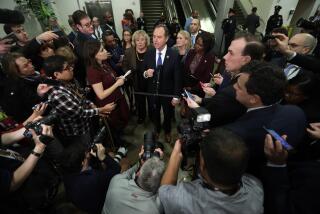Bank transactions put focus on Spitzer
WASHINGTON — The investigation that allegedly caught New York Gov. Eliot Spitzer paying a call girl for sex was triggered by an elaborate financial surveillance system that was expanded after the Sept. 11 attacks to snare terrorists, drug traffickers, international organized-crime figures and white-collar criminals, federal law enforcement officials said Tuesday.
The federal Bank Secrecy Act requires financial institutions to report suspicious transactions to the Treasury Department. Those transactions are then reviewed and, in some cases, passed on to criminal investigators if they suggest potential illegal activity. That is what happened in the case of Spitzer, according to federal law enforcement authorities, who said it was the alleged transactions themselves -- and not the governor or the high-priced prostitution ring now linked to him -- that prompted the investigation.
“Nobody went after Spitzer. Nobody went after a prostitution ring,” said one federal law enforcement official, speaking on the condition of anonymity because the investigation is sensitive and ongoing.
“If something looks suspicious, we’ve got to check it out. That’s what they did here, and, bizarrely, one thing led to another.”
The scandal broke Monday, when the New York Times website disclosed that federal authorities had identified Spitzer as one of the clients who had used the Emperors’ Club VIP call-girl service.
Emperors’ Club says it caters to wealthy men seeking beautiful young female consorts in New York, Washington, Miami, London, Paris and Los Angeles. A federal wiretap captured a man identified as “Client 9” -- a regular customer of the Emperors’ Club -- arranging a date last month with a petite brunet who used the name Kristen, an FBI affidavit said. Spitzer, 48, who is married with three teenage daughters, was Client 9, federal law enforcement officials have said.
Spitzer remained in his Upper West Side apartment Tuesday as a mounting chorus calling for his resignation or possible impeachment echoed across New York. Once considered a rising Democratic political star with potential presidential aspirations, Spitzer huddled with family, advisors and legal staff throughout the day, dodging demands to make a decision about his political future. It remained unclear whether he would resign and if he would face charges.
Spitzer has retained the law firm of Paul, Weiss, Rifkind, Wharton & Garrison. Michele Hirshman, former chief of the public corruption unit in the Manhattan U.S. attorney’s office and a former colleague of Spitzer’s when she served as New York’s first deputy attorney general, is the lead attorney, said Madelaine Miller, a spokeswoman for the firm.
Law enforcement sources were quoted by the Associated Press and Newsday saying that Spitzer spent as much as $80,000 during numerous liaisons with Emperors’ Club prostitutes. Newsday also reported that Spitzer drew the attention of bank officials when he split one financial transaction of at least $10,000 into three smaller ones to evade reporting requirements. Citing unnamed law enforcement sources, the newspaper reported that Spitzer then tried unsuccessfully to take his name off the three transactions.
After Spitzer was first linked to the prostitution ring, he apologized for unspecified bad behavior at a hastily called news conference. But he has not admitted publicly that he consorted with prostitutes or that he knowingly engaged in suspicious or illegal financial transactions.
On Tuesday, authorities said it is the transactions themselves that could get Spitzer into legal trouble, especially if authorities determine that he was trying to “structure” them to avoid reporting requirements or disguise the true nature of the payments.
According to the federal law enforcement official, Spitzer’s bank reported his suspicious transactions, as required under the Bank Secrecy Act, by electronically filing at least one Suspicious Activity Report, or SAR. One financial crimes expert, former senior FBI official Dennis Lormel, said that SARs have been required for many more financial transactions since the Sept. 11 attacks and that bank compliance officers “have come down really hard” on financial institutions.
The SARs are forwarded by the Internal Revenue Service to a Treasury Department agency known as FinCEN, the Financial Crimes Enforcement Network.
SARs usually contain the names of the senders and receivers of financial transactions and information from bank officials about why they believe the transactions were suspicious, said Lormel, who is now senior vice president for anti-money laundering for Virginia-based Corporate Risk International.
It is illegal to disclose publicly that a SAR has been filed, but the information is widely disseminated to federal and even state law enforcement agencies, Lormel said.
In Spitzer’s case, agents from the IRS’ criminal investigation division, and later the FBI public corruption squad, began to unravel the threads of the financial transactions. They linked cash payments first to accounts tied to suspicious front companies and then, ultimately, to the Emperors’ Club call-girl ring, according to the federal law enforcement official and a second person familiar with the probe.
Lormel, who used SARs to investigate dozens of cases for the FBI, from white-collar crimes to terrorism to drug trafficking, said that he was surprised to see the savvy former New York attorney general in his current predicament. “I’m just dumbfounded that a guy of his stature and his investigative experience would allow himself to be tripped up like that. He should know that there are [bank] reporting requirements there,” Lormel said. “And, of course, he should know the difference between right and wrong too. It just baffles me.”
Meanwhile Tuesday, Republicans in Albany and across New York ramped up calls for Spitzer to step down. The state Assembly’s Republican minority leader, Jim Tedisco, demanded that Spitzer leave office within the next 48 hours or risk facing impeachment. “This is really going over the top in terms of a breach of ethics for a governor,” Tedisco said. “It really illustrates he has compromised his ability to lead.”
Democratic Assemblyman Dov Hikind said that the mood in Albany was “disbelief” and that lawmakers were waiting for Spitzer to resign. “People are looking in the air like ‘Is this really happening?’ ” he said. “It’s wildly unbelievable. This is beyond science fiction.”
Douglas Muzzio, a Manhattan-based political consultant, said: “He’s got to resign. He can’t weather the impeachment proceedings” and he added that Spitzer could be using his resignation as a “political bargaining chip.”
A Spitzer aide said the governor had not made a decision yet and had no plans as of Tuesday to make an announcement. “This office has never confirmed there would be a resignation,” said Jennifer Givner, a spokeswoman for Spitzer. “Eliot Spitzer is still the governor of New York state.”
If Spitzer steps down, the state’s lieutenant governor, David Paterson, would become New York’s first African American governor. He also is legally blind.
If Paterson takes over, Hikind said, it would be good for the state. “He’s a guy that will not terrify anyone, will not threaten anyone. He will not be a steamroller, just a good guy bringing people together -- Democrats and Republicans.”
Spitzer earned the “steamroller” nickname after describing himself with the term and using profanity in a private call he made to Tedisco.
New York Republican state Sen. Martin J. Golden said Spitzer’s political base appears to be crumbling. “The people in the state of New York are very hurt,” said Golden. “Their trust has been violated, and it’s going to take a while to heal that.”
--
erika.hayasaki@latimes.com
Meyer reported from Washington and Hayasaki from New York.
More to Read
Sign up for Essential California
The most important California stories and recommendations in your inbox every morning.
You may occasionally receive promotional content from the Los Angeles Times.










